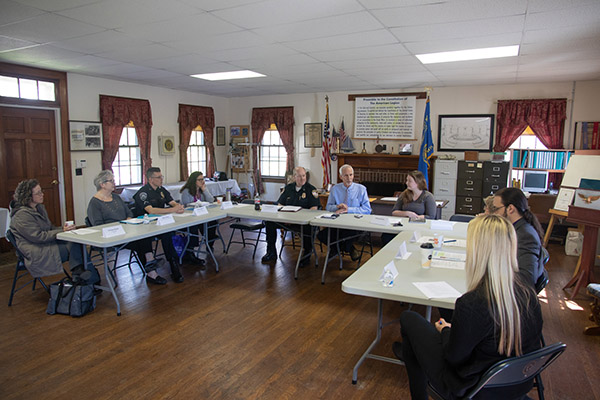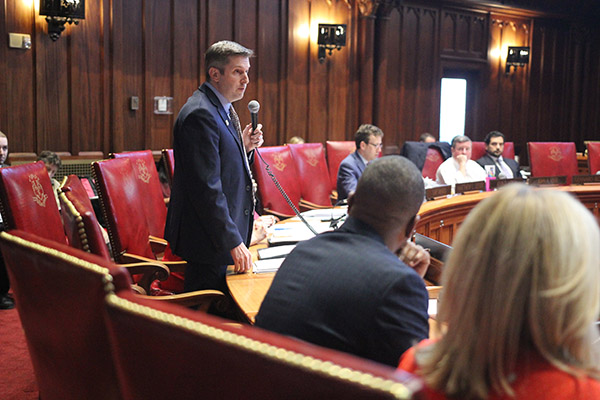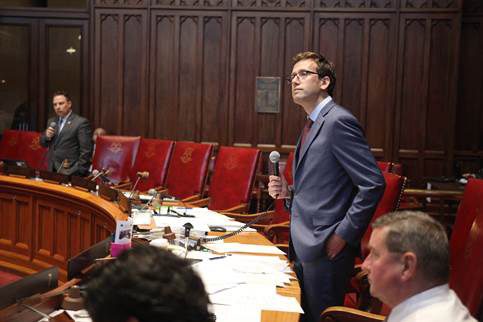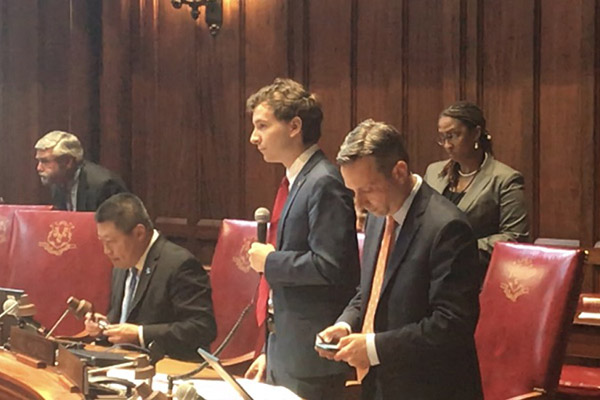Senator Needleman Leads Regional Roundtable Discussion on Better Responses and Solutions to the Opioid Crisis

State Senator Norm Needleman, center, leads a roundtable discussion on responses to the opioid crisis Thursday in East Hampton.
EAST HAMPTON, CT – Today, State Senator Norm Needleman (D-33rd District) led a roundtable discussion on the opioid crisis in Connecticut and in local communities at the East Hampton American Legion Post 64. Over the course of an hour, Sen. Needleman joined a coalition of community leaders, including law enforcement, nonprofit and healthcare professionals, as well as those personally affected by addiction, to discuss current responses, what strategies do and don’t work, and how to better battle opioid addiction.
Joining Sen. Needleman were Chief Dennis Woessner of the East Hampton Police Department, Senior Officer Robert Labonte of the Colchester Police Department, Colchester Youth and Social Services Director Valerie Geato, East Haddam Youth and Family Services Director Toni McCabe, Youth & Prevention Program Coordinator for East Haddam Youth and Family Services John Fournier, Barbara Moore of the Stronger Bridges Support Group, and a mother and daughter who spoke of their experiences with addiction and seeking treatment.
Planned to coincide with this weekend’s national Drug Take-Back Day, the roundtable discussion covered topics including making Narcan, an opioid overdose reversal drug, available to law enforcement officers free of charge. Chief Woessner said his department responded to eight overdoses in 2018 using Narcan, and while all eight lives were saved, the department has to pay for every dose. The Richards discussed the need to involve those who have experienced addiction in designing and planning treatment programs and expanding access to proper recovery programs. The discussion also touched upon current and future approaches to police response, community support and education for opioids and addiction.
“It’s great bringing people together from all different perspectives, from people who deal with prevention on a daily basis, to the police, who are very sympathetic and understanding, to people in recovery and people from state and other treatment facilities, to converse and try to find solutions to what is an intractable problem,” said Sen. Needleman. “The state needs to do its part, but communities, locally, need to work together. And I think it’s particularly important to note we need to be very careful about demonizing people who fall into the trap of addiction. No one is born wanting to be an addict. We need to help our children, our friends, our parents, our neighbors.”
“I want to thank Sen. Needleman for having me,” said Brittany Richards, who has struggled with addiction. “We got out a lot of things we needed to in regards to the changes we need in treatment and recovery. I have been pushing and trying to get into things like this for a long time, and he’s the only Senator I’ve seen trying to make a change in addiction. You need support when you’re an addict, especially when you’re going through recovery, and I find there’s not as much support, and there’s a lot of stigmatization. There is still a big stigma.”
“It’s an epidemic, and we need a team approach to try to solve it,” said Chief Woessler. “We need to work together to stop this problem.”
“It’s always beneficial to have the opportunity to bring prevention groups and individuals from the recovery community together to discuss the issues we’re all trying to deal with on a daily basis,” said McCabe. “I would love to see next steps in terms of where we go from here. This was a very beneficial conversation, but it’s only the beginning.”






